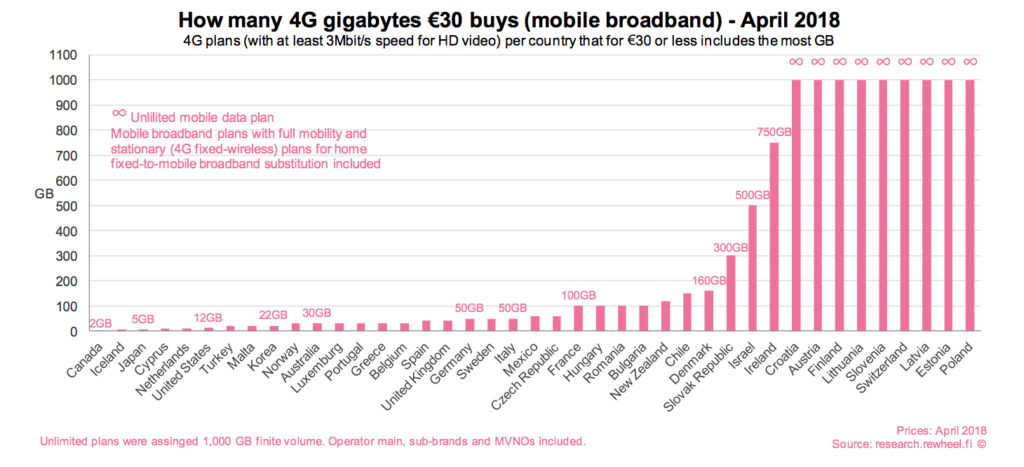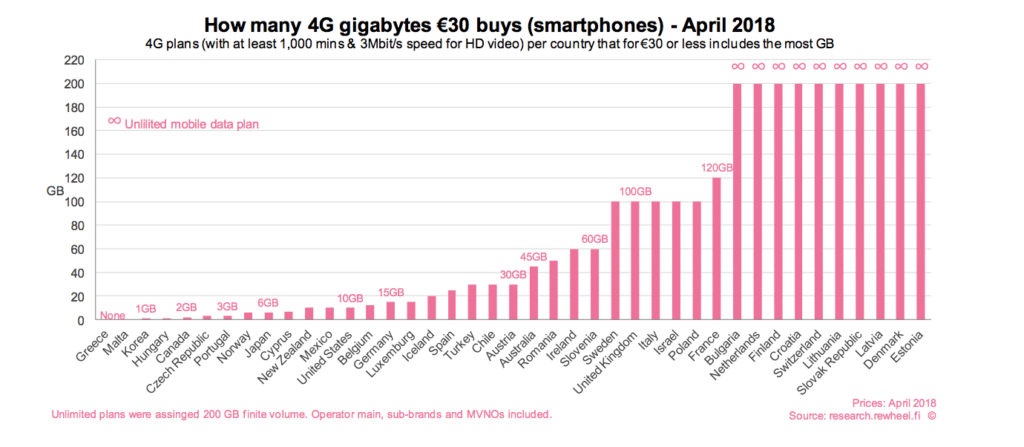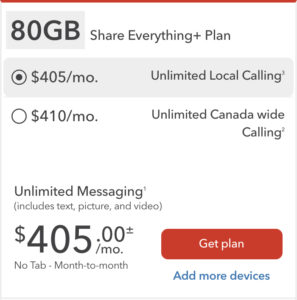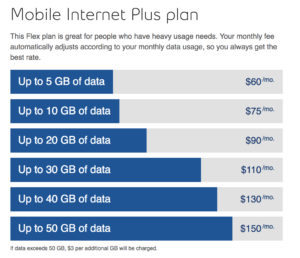The sad state of Canadian wireless pricing is old news for consumers and the government, but a new report graphically demonstrates how Canadians face some of the least competitive pricing in the developed world. The Rewheel study measured pricing in EU and OECD markets by examining how many gigabytes of 4G wireless data consumers get for the equivalent of 30 euros. This chart from Rewheel says it all:

Rewheel Research – The state of 4G pricing ̶ 1H2018 http://research.rewheel.fi/downloads/The_state_of_4G_pricing_DFMonitor_9th_release_1H2018_PUBLIC.pdf
Canada is at the far left of the chart with consumers getting less for their money than anyone else. While many countries offer unlimited mobile data at that price, the report says Canadian carriers offer a measly 2 GB. The smartphone data plans aren’t much better, with nearly all countries offering better deals and many shifting to unlimited data at that price.

Rewheel research – The state of 4G pricing ̶ 1H2018 http://research.rewheel.fi/downloads/The_state_of_4G_pricing_DFMonitor_9th_release_1H2018_PUBLIC.pdf
While it falls outside of the Rewheel study, a quick review of the major carriers reveals that some offers can’t be purchased in Canada at any price as no one offers unlimited mobile data. Rogers smartphone plans in Ontario max out at 80 GB of data at a cost of $405 per month or 263 euros (consumers in the UK can get 100 GB for 30 euros).

https://www.rogers.com/consumer/wireless/smartphone-plans?ipn=1
Meanwhile, Bell’s mobile broadband service tops out at 50 GB of data for $150. At $3 for each additional GB, it would cost $300 for 100 GB (France and New Zealand have plans for 30 euros for 100 GB) and $1500 for 500 GB (Israel has 500 GB for 30 euros).

https://www.bell.ca/Mobility/Cell_phone_plans/Turbo-Stick-and-Turbo-Hub-data-plans
In addition to outrageously expensive wireless data plans, Canadians also face huge overage charges (more than a billion dollars per year generated in the wireless overage cash grab) and steadily increasing roaming charges. Yet when it came to introducing greater resale competition, the CRTC rejected new measures that it admitted could result in some improvement to affordability.








Should I be considering a satellite-based service from a supplier in the EU?
A common phrase that comes to mind: “… What the market will bear.”
In economies with monopolies that are responsive to a shareholder body, the requirement to have greater profit at any cost will continue to drive prices up and services down. Other simple examples:
Airlines – Less service, less comfort, more cramped, baggage fees, etc;
Banks – Service fees, less tellers… (Really… when’s the last time a major bank hasn’t broken a record for profit per quarter in the last twenty years???)
Health care and other government organizations – Need to reduce costs? Increase the fees to access the services and/or reduce ‘front line staff’ (Hospitals, any gov’t office…)
GRRRRRRRRRRR….
I’m betting if a company were to offer all inclusive, unlimited service for 70% of what they charge now, the reduction in monthly profit would disappear in a month or two from the probable gain of about 70-90 of the customer base in their area of operations…
Their plans are also getting more expensive, contrary to the global trend. I have an 100GB for $150 mobile broadband plan from Bell that I got less than a year ago. I was unpleasantly surprised to see they now offer half as much for the same price.
In doing a bit of research, I discovered that it would be considerably cheaper for me to have my mobile account in Buffalo with a U.S. telecom with unlimited calls to Canada than I am paying Rogers Communications, Bell Canada or TELUS. All I have to do is somehow find a Buffalo address, which I am now trying to find.
Como Recuperar Uma Empresa em Declínio? http://www.fahrschule-schaedlich.de/cgi-std/gaestebuch.cgi
Pingback: Not So Fast: Digging into MEI's Report on the State of Canadian Wireless Services - Michael Geist
Pingback: Professional Scam Artists – part 16 | A Yappy Trade Barrier